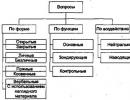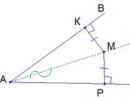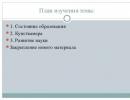The meaning of Yankovich Fedor Ivanovich (De Mirievo) in a brief biographical encyclopedia. III. about teaching aids in the main public schools
Jankovic de Mirievo Fedor Ivanovich - pedagogical ideas
In 1773 he was appointed director of public schools in Temesvar, and in 1774 he received the dignity of nobility and added the name of his family estate in Serbia - de Mirievo to his surname. The teacher took part in the implementation of the school reform undertaken by Empress Maria Theresa. The aim of the reform was to introduce a new system in Austria public education in the manner of the Prussian. The advantages of the new system, legalized by the charter of 1774, consisted in the creation of a wide network of elementary and higher public schools, thorough training of teachers, the introduction of rational teaching methods, and the establishment of a special educational administration. It was Janković's responsibility as director of schools in a province inhabited by Orthodox Serbs to adapt the new school system to local conditions. In 1776, the teacher visited Vienna and got acquainted in detail with the teacher's seminary there, after which he translated German school manuals into Serbian and compiled a manual for teachers in his province.Shortly after the new system of public education was established in Austria, Empress Catherine II decided to introduce it in Russia. Introduced to this system Russian empress Emperor Joseph II and pointed out to her Yankovich as the person most suitable for organizing public schools in Russia according to the Austrian model
In 1782, at the invitation of Catherine II, Yankovich came to Russia. Soon, in order to carry out school reform, a commission was formed to establish public schools. The commission was instructed to: 1) draw up and gradually lead and execute overall plan public schools, 2) to train teachers and 3) to translate into Russian or recompose the necessary teaching manuals. In the implementation of all these undertakings, Yankovic took an active part. Working in the commission (1782-1801), he drew up a plan for the school system (fixed in the Charter of 1786), according to which small public schools and main public schools were established. Yankovich organized the training of teachers for these schools at the St. Petersburg Main Folk School, open on his initiative, of which he was the director from 1783 to 1785. Il h> the students, to whom he pointed out the importance of a friendly relationship between the teacher and the children, began to teach in the first reformed schools. Yankovic made a great contribution to the preparation of textbooks for public schools. More than half of the textbooks were compiled either by himself or according to his plan and under his direction. Some have been redone by him. With his participation, a set of textbooks was published (“Primer”, “Recipes and for them a guide to calligraphy”, “Rules for students”, “ The World History”, etc.), geographical and historical maps, atlases were prepared. Yankovich introduced the use of chalkboard and chalk. He also participated in solving numerous issues considered by the commission: the transformation of the curricula of the land, artillery, engineering corps, the society for the education of noble maidens and the school of petty-bourgeois girls, private educational institutions; consideration of the higher educational institutions of Austria, on the model of which it was supposed to arrange Russian universities and gymnasiums. Drawing up instructions to the chiefs and visitors (auditors) of educational institutions was also entrusted by the commission to Yankovich. When the Ministry of Public Education was established in Russia (1802), Yankovich became a member of the newly formed commission on schools, which in 1803 became known as the main board of schools. In the ministry, whose activities at first were led by a circle of personal friends of Emperor Alexander I, Jankovic did not enjoy influence, although he worked in all the most important areas, both administrative and educational.
Yankovich Fedor Ivanovich (de Mirievo) Yankovich de Mirievo (Fyodor Ivanovich) - teacher (1741 - 1814). He came from an ancient Serbian family that moved to Hungary in the middle of the 15th century. Studied jurisprudence, state and economic sciences at the University of Vienna; He became a secretary to the Temeswar Orthodox Bishop. In 1773, Janković, appointed as the first teacher and director of public schools in the Temeswar Banat, took part in the implementation of an extensive educational reform undertaken by Empress Maria Theresa. The purpose of this reform was the introduction in Austria of a new system of public education, which appeared first in Prussia and was developed by the rector of the Sagan Augustinian monastery, Felbiger. The advantages of the new system, legalized by the charter of 1774, consisted in the harmonious concentration of elementary and higher public schools, thorough training of teachers, rational teaching methods, and the establishment of a special educational administration. Janković's duties, as director of schools in a province inhabited by Orthodox Serbs, were to adapt the new educational system to local needs and conditions. In 1776, he visited Vienna and got acquainted in detail with the teachers' seminary there, after which he translated into Serbian the German manuals introduced into the new schools, and compiled a manual for teachers in his province, under the title: "Handbook required for masters of Illyrian non-Uniate small schools ". In 1774, he received the dignity of nobility and the name de Mirievo, as his family estate in Serbia was called, was added to his surname. Shortly after the new system of public education was established in Austria, Empress Catherine II decided to introduce this system in Russia. Emperor Joseph II introduced her to the Empress during a meeting in Mogilev, and at the same time he ordered textbooks for Austrian normal schools for her and pointed out Yankovich to her as the person most suitable for organizing public schools in Russia according to the Austrian model. Soon after the arrival of Yankovich, in 1872, it was formed under the chairmanship of P.V. Zavadovsky commission on the establishment of public schools, which included Epinus, Pastukhov and Yankovich. The commission was instructed to: 1) draw and gradually implement the general plan of public schools, 2) train teachers, and 3) translate into Russian or recompose the necessary teaching manuals. In the implementation of all these enterprises, Yankovic took an active part. The educational part of the initial plan for the establishment of public schools compiled by him was approved on September 21, 1782. At the same time, Yankovich took the post of director of the St. Petersburg main public school, in which the training of teachers was first concentrated. He held this position until 1785, when he was replaced by O.P. Kozodavlev; but even after that, all orders relating to schools and especially the teacher's seminary that was with him, were made on the advice of Yankovich. Most of the work put Yankovic on translation from German or compiling textbooks for public schools. More than half of the textbooks were compiled either by Yankovic himself, or according to his plan and under his direction, or, finally, redone by him, and all of them were approved by the Empress, for whose approval they were all presented, with the exception of mathematical ones. Finally, Yankovic participated in the resolution of all urgent educational issues submitted to the commission: in the transformation of the curricula of the corps of the land, artillery, engineering, society for the education of noble and the school of petty-bourgeois girls and private educational institutions, in the consideration of higher educational institutions in Austria, on the model of which it was supposed to arrange Russian universities and gymnasiums. Drawing up instructions to the chiefs and visitors (auditors) of educational institutions was also entrusted by the commission, for the most part, to Jankovic. Elected in 1783 as a member of the Russian Academy, he was involved in works on the word-producing dictionary. The department into the letters I and I was compiled by him together with the St. Petersburg Metropolitan Gabriel. After that, he was instructed to supplement and reprint the comparative dictionary of all languages, compiled by Academician Pallas. This work, completed in 1791, was published under the title: "A Comparative Dictionary of All Languages and Dialects, arranged in alphabetical order." It contained 61,700 words from 279 languages - European, Asian, African and American. Upon the establishment in 1802 of the Ministry of Public Education, Yankovic became a member of the newly formed commission on schools, which in 1803 became known as the main board of schools. In the ministry, whose activities at first were led by a circle of personal friends of Emperor Alexander I, Yankovich did not enjoy influence, although he worked on all the most important administrative and educational issues. In 1804 he left the service. Wed A. Voronov "Fyodor Ivanovich Yankovich de Mirievo, or Public Schools in Russia under Empress Catherine II" (St. Petersburg, 1858); his own "Historical and statistical review of educational institutions of the St. Petersburg educational district from 1715 to 1828 inclusive" (St. Petersburg, 1849); Count D.A. Tolstoy "City Schools in the Reign of Empress Catherine II" (St. Petersburg, 1886, an impression from Volume LIV of "Notes of the Imperial Academy of Sciences"); S.V. Rozhdestvensky "Historical review of the activities of the Ministry of Education. 1802 - 1902" (St. Petersburg, 1902). S. R-sky.
Biographical Dictionary. 2000 .
See what "Yankovic Fedor Ivanovich (de Mirievo)" is in other dictionaries:
Jankovic Mirijevski Fedor Ivanovich (Theodor) (1741 1814) Serbian and Russian teacher, follower of J. A. Comenius, member of the Russian Academy of Sciences (since 1783). From 1782 he lived in Russia, participated in the development of a plan for school reforms 1782 86. ... ... Big encyclopedic Dictionary
Yankovich de Mirievo [Mirievsky (Jankovič Mirijevski)] Fedor Ivanovich (Theodor), Russian and Serbian teacher, follower of Ya. A. Comenius, member of the Russian ... ...
Teacher, first director of public schools; Serb by origin, was born in 1741 in the town of Kamenice Sremska, near Peterwardein. The surname Jankovic was one of the oldest noble families and owned the village of Mirievo near Belgrade. When Turks... Big biographical encyclopedia
Teacher (1741 1814). He came from an ancient Serbian family, who moved in the middle of the 15th century. to Hungary. He studied jurisprudence, state and economic sciences at the University of Vienna, and became a secretary to the Temeswar Orthodox Bishop ...
- (Fyodor Ivanovich) teacher (1741 1814). He came from an ancient Serbian family, who moved in the middle of the 15th century. to Hungary. He studied jurisprudence, state and economic sciences at the University of Vienna, joined the secretary of the Temeswar ... ... Encyclopedic Dictionary F.A. Brockhaus and I.A. Efron
Fedor Ivanovich (1741 05/22/1814), teacher, member of the Russian Academy (1783). Serb by origin. Educated at law faculty University of Vienna. In 1782, at the invitation of Catherine II, he moved to Russia. He worked in the Commission on ... ... Russian history
- (Jankovic Mirijevski) Fedor Ivanovich (Theodor) (1741 1814), Serbian and Russian teacher, follower of J. A. Comenius, member of the Russian Academy of Sciences (since 1783). From 1782 he lived in Russia, participated in the development of a plan for school reforms 1782 86. Textbooks and ... ... encyclopedic Dictionary
JANKOVICH DE MIRIEVO- [Mirievsky (Jankovio Mirijevski)] Fedor Ivanovich, teacher, member. Russian Academy (1783). Serb by origin. Educated in law. f those of the University of Vienna ... ... Russian pedagogical encyclopedia
- [Mirievsky (Jankovič Mirijevski)] Fedor Ivanovich (Theodor), Russian and Serbian teacher, follower of J. A. Comenius (See Comenius), member of the Russian ... ... Great Soviet Encyclopedia
Theodor Jankowitsch de Miriewo- (serb.: Teodor Janković Mirijevski, russisch Fedor Ivanovich Janković de Mirijevob, translit.: Fjodor Iwanowitsch Jankowitsch de Mirijewo; * 1741 Kamenitz, heute zu Novi S ... Deutsch Wikipedia
Books
- Fedor Ivanovich Yankovich de Mirievo or public schools in Russia under Catherine II. , Voronov A.. The book is a reprint edition of 1858. Although serious work has been done to restore the original quality of the edition, some pages may…
Nickname under which he writes political figure Vladimir Ilyich Ulyanov. ... In 1907 he was unsuccessfully a candidate for the 2nd State Duma in St. Petersburg.
Alyabiev, Alexander Alexandrovich, Russian amateur composer. ... The romances of A. reflected the spirit of the times. As then-Russian literature, they are sentimental, sometimes corny. Most of them are written in a minor key. They almost do not differ from Glinka's first romances, but the latter has stepped far ahead, while A. has remained in place and is now outdated.
Filthy Idolishche (Odolishche) - an epic hero ...
Pedrillo (Pietro-Mira Pedrillo) - a famous jester, a Neapolitan, who arrived in St. Petersburg at the beginning of the reign of Anna Ioannovna to sing the roles of buffa and play the violin in the Italian court opera.
Dahl, Vladimir Ivanovich
Numerous novels and stories of his suffer from the absence of a real artistic creativity, a deep feeling and a broad view of the people and life. Dal did not go further than everyday pictures, anecdotes caught on the fly, told in a peculiar language, smartly, lively, with well-known humor, sometimes falling into mannerism and joking.
Varlamov, Alexander Egorovich
Apparently, Varlamov did not work on the theory of musical composition at all and remained with the meager knowledge that he could have taken out of the chapel, which at that time did not care at all about the general musical development of its pupils.
Nekrasov Nikolai Alekseevich
None of our great poets has so many verses that are downright bad from all points of view; he himself bequeathed many poems not to be included in the collection of his works. Nekrasov is not sustained even in his masterpieces: and in them the prosaic, sluggish verse suddenly hurts the ear.
Gorky, Maxim
By his origin, Gorky does not at all belong to those dregs of society, of which he acted as a singer in literature.
Zhikharev Stepan Petrovich
His tragedy "Artaban" did not see a print or a stage, since, according to Prince Shakhovsky and the author's frank opinion, it was a mixture of nonsense with nonsense.
Sherwood-Verny Ivan Vasilievich
“Sherwood,” writes one contemporary, “in society, even in St. Petersburg, was called nothing but Sherwood nasty ... comrades in military service they shunned him and called him by the dog name "fidelka".
Obolyaninov Petr Khrisanfovich
... Field Marshal Kamensky publicly called him "a state thief, a bribe-taker, a fool stuffed."
Popular biographies
Peter I Tolstoy Lev Nikolaevich Catherine II Romanovs Dostoevsky Fyodor Mikhailovich Lomonosov Mikhail Vasilyevich Alexander III Suvorov Alexander Vasilyevich
(1741 )- Novi Sad, Serbia
- St. Petersburg, the Russian Empire
Biography
Origin
Serb by origin. Born in 1741 in the town of Kamenice-Sremskaya (Serbian), near Petrovaradin.
Yankovich was the director of the main public school and the teacher's seminary under it until May 17, 1785, when, due to numerous responsibilities for the preparation and implementation of the education reform in Russia, he was released from the direct management of these educational institutions.
Empress Catherine II repeatedly honored Yankovic with her attention. In 1784 he was awarded the rank of collegiate councilor, and in 1793 - state councilor. In addition, he was awarded the Order of St. Vladimir - 4th class. (1784), and then the 3rd Art. (1786). In 1791, Catherine granted him a village in the Mogilev province and in the same year ranked him among the Russian nobility. In the reign of Emperor Paul I, he was awarded the rank of real state councilor and, in addition to the salary he received, he was given a pension of 2000 rubles, and in 1802 he was granted rent in the Grodno province.
Education reform in Russia
According to the reform developed by Yankovic, public schools were to be divided into three categories: small schools (two grades), secondary schools (three grades) and main schools (four grades).
In schools of the first category, they were supposed to teach - in the first grade: reading and writing, knowledge of numbers, church and Roman numbers, an abbreviated catechism, sacred history and the original rules of Russian grammar. In the 2nd - after repeating the previous one - a lengthy catechism without evidence from scripture, reading the book "On the Positions of a Man and a Citizen", arithmetic of the 1st and 2nd parts, calligraphy and drawing.
In schools of the 2nd category, the first two classes of small schools were joined by a third class, in which, while repeating the previous one, they were supposed to teach a lengthy catechism with evidence from the Holy Scriptures, reading and explaining the gospel, Russian grammar with spelling exercises, general history and of general and Russian geography in an abbreviated form and calligraphy.
Schools of the 3rd category (main) were supposed to consist of 4 classes - the course of the first three is the same as in secondary schools; in the fourth grade were to be taught: general and Russian geography, General history in more detail, Russian history, mathematical geography with problems on the globe, Russian grammar with exercises in writing exercises used in the hostel, such as: in letters, accounts, receipts, etc., foundations of geometry, mechanics, physics, natural history and civil architecture and drawing.
The preparation of the first teachers for public schools, who were familiar with the requirements of didactics and pedagogy, lay exclusively with Jankovic. In this matter, he was a complete master, he examined young people who wanted to devote themselves to the teaching profession, introduced them to teaching methods and, at the request of the commission, appointed them to one or another place, depending on the abilities of each.
In 1785, the commission instructed Jankovic to draw up a regulation for private boarding houses and schools, which was later included in the charter of public schools, approved on August 5, 1786. According to the regulation, all private boarding schools and schools were to be subordinated, along with public schools, to the orders of the Public Charity. Education in private schools, equal to the public, was to be distinguished by family friendliness, simplicity in lifestyle and be done in a religious spirit.
The moral means of action on the pupils were determined in the following words of the mandate:
| Most of all, it is entrusted to landlords and teachers, so that they try to instill in their pupils and students the rules of honesty and virtue, preceding them in this and that, and in words: why should they be with them inseparably and remove from their eyes everything that can be an occasion to the temptation ... to keep, however, in the fear of God, forcing them to go to church and pray, getting up and going to bed, before the beginning and end of the teaching, before the table and after the table. To try also to give them innocent pleasures, when there are convenient occasions for this, turning them into a reward and always giving advantages to the most diligent and well-behaved. |
However, it is impossible not to notice that Yankovic's order had a very weak influence on the spirit of teaching and education in private boarding schools and schools. The reasons for this were, on the one hand, in the lack of educators who corresponded to the ideal presented in the mandate, and on the other hand, in the important circumstance that the requirements of the then society were far below this ideal and therefore made it possible for the existence of bad boarding schools, if only they taught in them French and dancing.
Yankovic's order for private boarding houses contained a bold for that time permission to raise male and female children together, and the landlords were charged with the obligation to have separate rooms for children of different sexes. This provision was abolished in 1804 . One of the shortcomings of the order was that it spoke only of private teachers in boarding houses and schools, but overlooked the private teachers who taught in private homes. The method of their examination and their relationship to the school authorities remained uncertain. Such uncertainty naturally led to a weakening of supervision over home teaching and opened up a wide field for abuse, especially on the part of foreign teachers.
The teaching methodology according to Jankovic was to consist of cumulative instruction, cumulative reading, images through initial letters, tables and a survey.
Jankovic was a supporter of live teaching of subjects, as opposed to the scholastic and mechanistic teaching methods that were then prevailing. Subsequently, his methods were extended, in addition to public schools, to religious schools and military corps.
Tutorials and guides
Jankovic also took an active part in compiling textbooks and teaching aids for teachers.
He owns the following textbooks and manuals:
- Alphabetical tables and for warehouses of church and civil printing (1782)
- Primer (1782)
- Abridged Catechism with and without Questions (1782)
- Recipes and with them a guide for calligraphy (1782)
- Rules for Students (1782)
- A lengthy catechism with scriptural evidence (1783)
- Sacred History (1783)
- World History (1784)
- Spectacle of the Universe (1787)
- An abridged Russian history extracted from detailed history composed by Stritter (1784)
- Abbreviated Russian geography
- General land survey.
Work at the Academy of the Russian
Almost immediately upon arrival in Russia, in 1783, Jankovic was elected to the first composition






